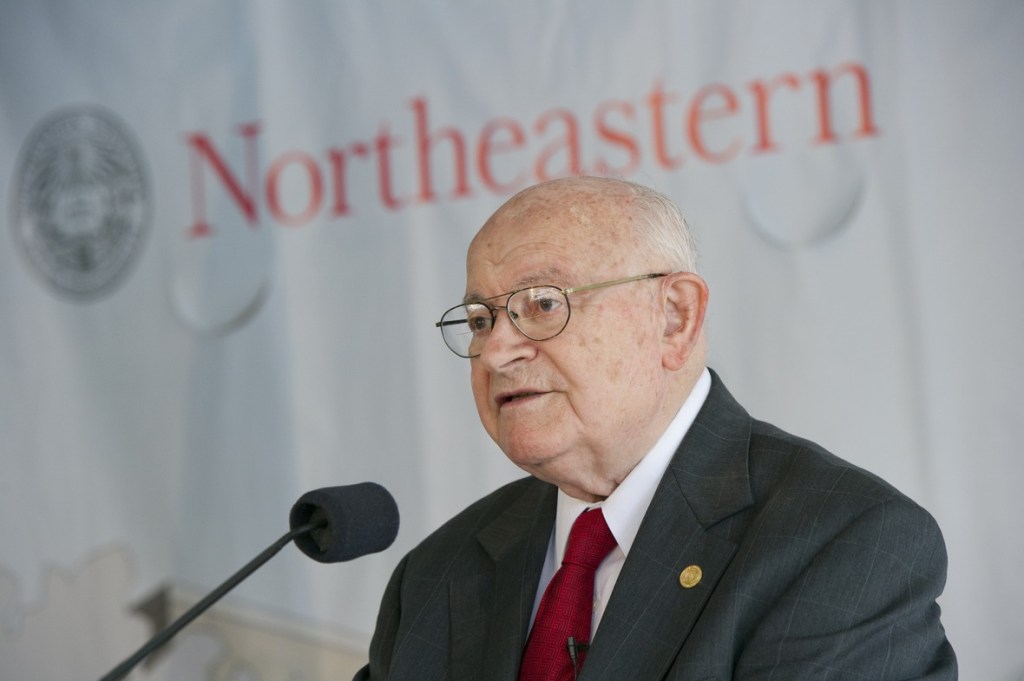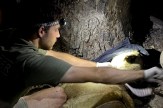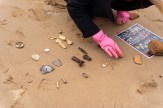Northeastern remembers graduate George Kostas, a visionary and a patriot

George J. Kostas, E’43, H’07, a visionary, patriot, and “son of Northeastern” whose investments have significantly advanced the university’s research in nanotechnology and homeland security, died Friday. He was 97.
Kostas’ longstanding relationship with Northeastern included a commitment to expanding the university’s research enterprise in areas of particular global significance. He invested $2 million to found and establish the George J. Kostas Nanoscale Technology and Manufacturing Research Center, and later made a $12 million investment to create the Northeastern’s George J. Kostas Research Institute for Homeland Security.
“George was a patriot, not merely in name, but in his deeds,” said Joseph E. Aoun, president of Northeastern. “His leadership transformed Northeastern and transformed the lives of all those, present and future, who work or learn under the institute and research center that proudly bear his name. His unflagging intellect and quest for humanity’s betterment will inspire discoveries there for generations to come.”
On the day of the Kostas Research Institute’s groundbreaking ceremony in September 2010, Kostas said, “This is one of the happiest days of my life.” The following year, the university opened the 70,000-square-foot secure, state-of-the-art facility.

George J. Kostas and President Joseph E. Aoun at the Kostas Research Institute’s groundbreaking in 2010. Photo by Mary Knox Merrill/Northeastern University
Kostas’ forward-thinking investments not only underscored his commitment to supporting research that addresses great societal challenges, but also paved the way for growth and discoveries that have multiplied the impact of his gifts many times over. Work at the George J. Kostas Nanoscale Technology and Manufacturing Research Center, for example, led the National Science Foundation to create a national center of excellence at Northeastern.
Kostas had an “innate hunger for knowledge” and “a profound loyalty and dedication to country,” said David Luzzi, Northeastern’s vice provost for research, innovation, and development and vice president of the Northeastern University Innovation Campus in Burlington, Massachusetts.
His legacy is not just the individual things he did, but what he showed—that is, how profoundly transformative one great son of the university who is willing to invest his time, his ideas, his generosity, and his vision can be to enabling the present and future success of the university.
—David Luzzi
Kostas’ lifetime commitment to Northeastern amounted to more than $17 million.
“His legacy is not just the individual things he did, but what he showed—that is, how profoundly transformative one great son of the university who is willing to invest his time, his ideas, his generosity, and his vision can be to enabling the present and future success of the university,” Luzzi said.
Luzzi noted that Friday, the day Kostas died, also marked the completion of construction of the facility at the Kostas Research Institute for state-of-the-art electron microscopes, which was supported by his most recent gifts. These instruments will provide important capabilities for characterization of materials and devices at the nanoscale.

George J. Kostas’ Northeastern yearbook portrait, 1943.
Born Sept. 2, 1919, Kostas was a native of Haverhill, Massachusetts, and the son of Greek immigrants. He earned a bachelor’s degree in chemical engineering at Northeastern in 1943 and completed the executive MBA program at Columbia University in 1967. In 2007, he received an honorary doctorate of science from Northeastern.
Upon graduation from Northeastern and at a time when the U.S. saw its supply of natural rubber from Southeast Asia cut off by Axis powers at the start of World War II, he was recruited to the U.S. Synthetic Rubber program while at its embryonic stage. Within a few years, American trucks, tanks, and planes were rolling to victory on petroleum-derived tires.
Luzzi said that Kostas viewed Northeastern as playing a critical role in the formative stages of his adult and professional life, adding that it was Kostas’ work at Northeastern for which he was selected to join the Army-led synthetic rubber program.
In 1946, Kostas was promoted to the General Tire and Rubber Corporation’s director of research and development for synthetic elastomers. The following year, he was named to the 12-member U.S. Research and Development Committee for Synthetic Rubber, on which he served until it dissolved in 1955.
He later founded in 1972 and served as president of Techno-Economic Services, Inc. Under his direction, Tesco developed “Xenoclad,” a revolutionary process based on his patents to plate aluminum in an atomic form on metal substrates to render them resistant to corrosion.





